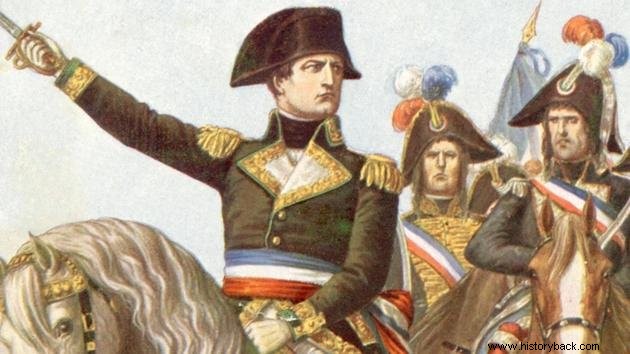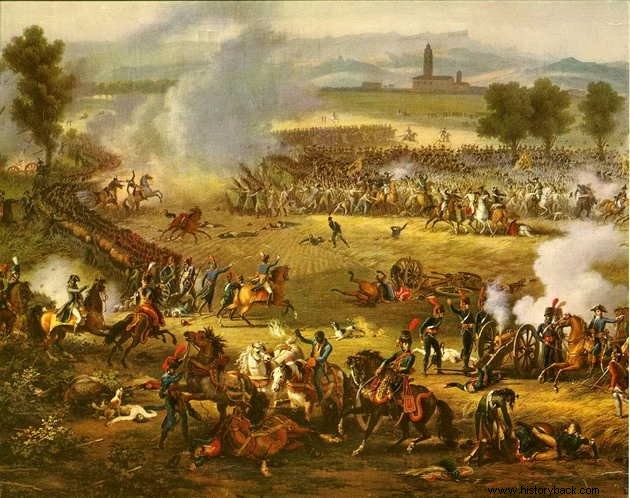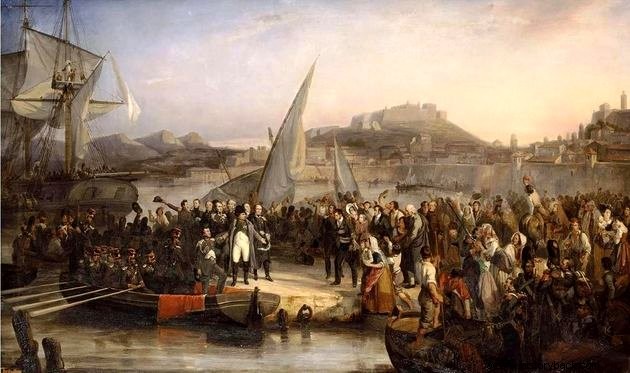The Napoleonic Era it took place from 1799 to 1815. It begins with the “Coup of the 18th Brumaire” and ends with the defeat of Napoleon Bonaparte at the Battle of Waterloo.
Napoleon comes to power supported by the bourgeoisie and the army, as his government would be the guarantee of the continuation of the ideals of the French Revolution.
Content Index
- Background of the Napoleonic Era
- Phases of the Napoleonic Era
- 18th Brumaire and Consulate Coup
- Napoleonic Empire (1804-1815)
- Hundred Days Government (1815)
- Congress of Vienna
Background of the Napoleonic Era

After the death of King Louis XVI (1754-1793), European nations fear that revolutionary ideals would spread.
To contain them, the First Coalition was formed in 1793, made up of Austria, Prussia, Holland, Spain and England against France.
In the midst of the war, the Jacobins arrested the Girondin leaders, promulgated the new Constitution of 1793 and began the period known as the Terror, with the suspension of individual rights and summary executions.
Therefore, the situation in France still scared the European leaders, who decided to form in 1798 the Second Anti-French Coalition, formed by Great Britain, Austria and Russia. It is in this context that Napoleon Bonaparte is seen as a solution by the various sectors of the bourgeoisie.
See also:French Revolution (1789)Phases of the Napoleonic Era
For purposes of study we can divide the Napoleonic Era into the following phases:
- Consulate (1799-1804)
- Napoleonic Empire (1804-1815)
- Government of the Hundred Days (20/03/1815 to 08/07/1815)
Coup of the 18th of Brumaire and Consulate
The Coup of the 18th Brumaire of 1799 was planned by the abbot Sieyès (1748-1836) and by Napoleon Bonaparte.
Napoleon deposed the Directory using a column of grenadiers and established the Consulate regime. Thus, three consuls concentrated power:Bonaparte, Sieyès and Ducos.
The trio coordinated the drafting of a new Constitution that established Napoleon as First Consul for a ten-year term. The Magna Carta still granted him dictator powers.
The dictatorial regime was used to defend France from external enemies. In this way, French banks opened a series of loans to support the wars that were fought.
The National Society for the Promotion of Industry is created, which helped boost industrial development.
See also:Coup of the 18th BrumaireConcordat with the Vatican
One of Napoleon's most important acts as Consul was to resume the dialogue with the Catholic Church, which had broken off during the revolution.
After several weeks of negotiation, France signed a Concordat with the Vatican in 1801.
In this treaty, the Church renounced claiming ecclesiastical properties that had been confiscated by the revolutionaries. On the other hand, the government would have the power to appoint bishops and the clergy would be paid by the state.
Napoleonic Empire (1804-1815)
With the support of French society, Napoleon promulgated in 1804 the Constitution of the year XII.
This provides for the replacement of the consular regime by the monarchy and inaugurates the French Empire. Bonaparte obtains approval of this Magna Carta in a plebiscite.
In 1804, Napoleon receives the title of Napoleon I, Emperor of the French. In order to usher in a new era, the ceremony took place in Paris, at Notre-Dame Cathedral and not in Reims, where French monarchs were traditionally crowned.
The coronation took place amidst France's war against the Third Anti-French Coalition, formed in 1803 by Great Britain, Russia and Austria.
See also:Napoleonic EmpireNapoleonic Civil Code
In 1804, the Napoleonic Civil Code was instituted, which institutionalized the transformations of the French Revolution.
With the new code, Napoleon guarantees the support of the bourgeoisie, the army and the peasants.
The Civil Code established equality before the law, guaranteed property rights and ratified the agrarian reform that took place in the French Revolution.
It also ensured the separation of Church and State and eliminated feudal privileges.
Napoleonic Wars

The First Napoleonic War took place against the Second Coalition, formed in 1798 by Great Britain, Austria, Russia, Portugal, the Ottoman Empire and the Kingdom of Naples. Due to diplomatic embarrassments, Russia left this coalition.
In 1800, France defeats Austria at the Battle of Marengo, and in 1802, Great Britain and France sign the Peace of Amiens.
The war, however, led to a financial crisis in France, which was alleviated with the creation of the Bank of France. The bank exercised control over the issuance of paper money, helping to reduce inflation.
France, with Spain as an ally, defeated the troops of Austria and Russia in the battles of Ulm and Austerlitz. At the Battle of Trafalgar by sea, however, French and Spanish troops were decimated by the British.
In 1806, Emperor Napoleon defeated the Holy Roman Empire and created the Confederation of the Rhine, which brought together most of the German states and proclaimed itself protector of this state.
Faced with this victory, Great Britain, Russia and Prussia form the Fourth Coalition.
This time, the Prussian army was quickly defeated in the Battle of Jena and the Russians in 1807 in the battles of Eylau and Friedland. Because of these last battles, the Treaty of Tilsit was signed, in the same year, in which the Russians became allies of the French.
With the defeat of the Fourth Coalition, Napoleon Bonaparte becomes the great lord of Continental Europe.
To administer so many territories, some were given to their relatives. His brothers Joseph, Louis and Jerome were crowned kings of Naples, Holland and Westphalia, respectively.
Her sisters Elisa, Carolina and Pauline, reigned over territories in the Italian Peninsula.
See also:Napoleonic WarsContinental Lock
Napoleon's war victories on the European continent did not affect the foreign trade of England, which had an excellent fleet.
The English were concerned with commercial competition with France and with the possibility of expanding the uprising of the popular strata against the bourgeoisie.
France, in turn, needed to consolidate consumer markets in Europe under English rule. As a way of weakening Great Britain, Napoleon imposes the Continental Blockade, prohibiting European countries from buying British products.
The British fleet, however, manages to market products with the American continent and prevented such business with France.
European countries, on the other hand, were pressing to be able to export their primary products and obtain manufactured goods produced in England.
The situation culminated in the breaking of commercial agreements and, in 1809, the Fifth Coalition was formed, made up of Great Britain and Austria.
The Russians also broke their agreement with France and were invaded, but the French army succumbed to winter. Of the 450,000 men who marched towards Russia, 150,000 remained at the base in Poland, but only 30,000 of those who invaded the country survived.
With the failure of the Napoleonic campaign in Russia, the Sixth Coalition was formed in 1813. They united against France:Prussia, Austria and Great Britain.
In March of that year, Napoleon Bonaparte is defeated at the Battle of Leipzig and a year later, the armies of the Sixth Coalition allies take Paris.
See also:Continental BlockadeHundred Days Government (1815)

With the support of the thousand men who made up his personal guard, Napoleon Bonaparte leaves the Isle of Elba and advances towards Paris. Resistance was futile, as the battalion sent by Louis XVIII refused to imprison him.
With the support of the soldiers, Napoleon takes Paris and starts the so-called Government of the Hundred Days. Louis XVIII (1755-1824) fled to Belgium.
White Terror
The winning nations meet at the Congress of Vienna to discuss what Europe would be like after the wars waged by Napoleon. He was sent to the Isle of Elba and King Louis XVIII was restored to the throne.
The White Terror begins, where the aristocracy and high clergy return to the political scene and take the opportunity to take revenge on the republicans.
The return of land confiscated by peasants during the Revolution is demanded. Therefore, the riots, massacres and persecutions begin.
See also:Terror in the French RevolutionBattle of Waterloo
The news of Bonaparte's return hits Vienna like a bombshell. The Seventh Coalition is formed and the armies face off at the Battle of Waterloo, Belgium.
Defeated, Napoleon Bonaparte abdicates the throne of France and is exiled to the island of Saint Helena, off the coast of Africa, and died in 1821.
See also:The Battle of WaterlooCongress of Vienna
With the Battle of Waterloo, the Napoleonic Era comes to an end and the attempt to restore the Ancien Régime through the Congress of Vienna (1814-1815) begins.
The Congress instituted a policy of territorial compensation for the winning nations and the equivalence of forces between European nations.
See also:Congress of Vienna (1814-1815)Keep researching the subject:
- France
- French Republic
- Contemporary Age
